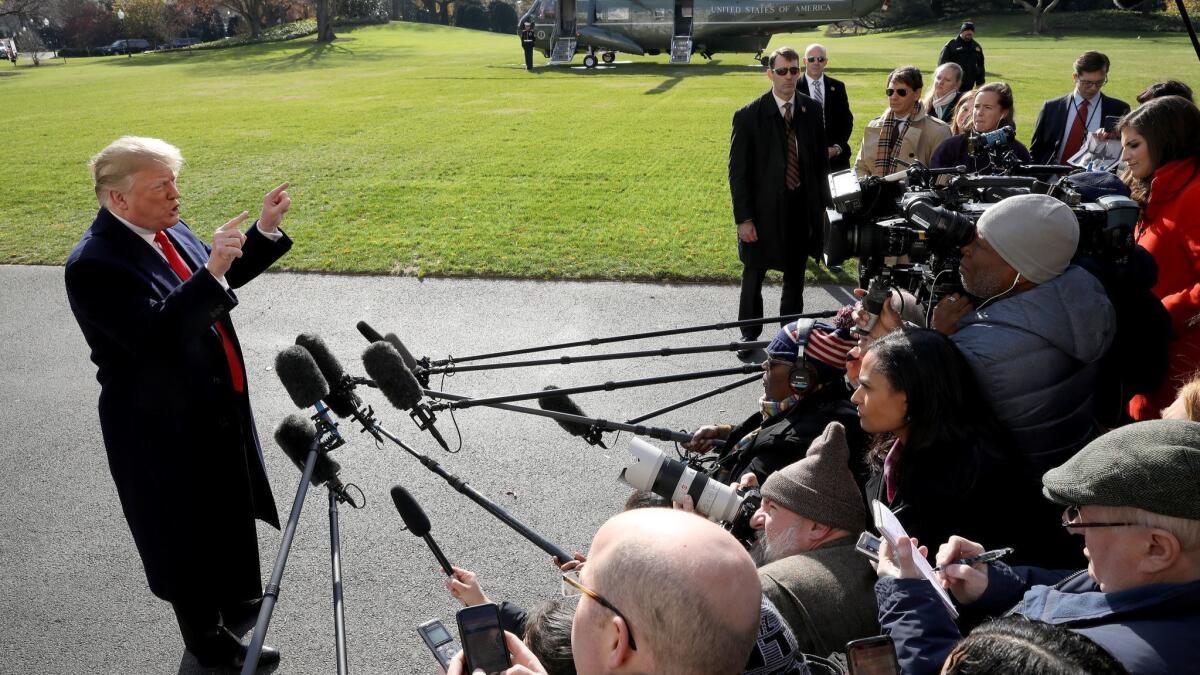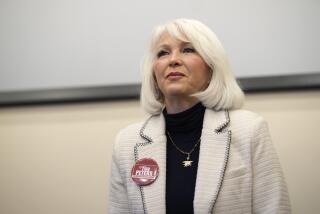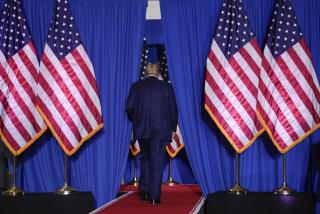Mueller’s targets seem to share a problem: They tell whoppers
Reporting from Washington — After lying to the Internal Revenue Service to avoid paying taxes and lying to banks to obtain fraudulent mortgages, Paul Manafort was convicted last August — and then pledged to tell the truth as part of a plea deal to avert a second trial.
But prosecutors say Manafort, President Trump’s former campaign chairman, lied about that too — and they told a federal judge Friday they may file new charges against him. A day earlier, Trump’s longtime lawyer, Michael Cohen, pleaded guilty to lying to Congress about seeking a Moscow real estate deal.
The back-to-back court hearings highlighted how, one after another, Trump’s closest former aides and associates have told brazen, audacious and criminal whoppers in the wide-ranging investigation led by special counsel Robert S. Mueller III.
“It’s like an organized crime consortium where everyone is lying and obfuscating, except it’s an investigation of the president of the United States and his campaign,” said Harry Litman, a University of California law professor and former federal prosecutor. “It’s such a hall of mirrors.”
At the center of the drama is Trump, who has exhausted independent fact checkers with a blizzard of falsehoods. The Washington Post says he has made more than 6,400 false or misleading statements publicly since taking office and averaged 30 a day in the weeks before last month’s midterm election.

Moreover, Trump has cheered witnesses who resist cooperating with the special counsel’s office, and he accused prosecutors on Mueller’s team of encouraging Manafort and other suspects to lie.
“If you told the truth, you go to jail,” the president complained to the New York Post on Wednesday.
Deception is a challenge for any prosecutor. Nick Akerman, who worked with the Watergate special prosecutor, said witnesses “baldly lied” to the grand jury investigating the break-in at the Democratic National Committee headquarters in 1972 and the subsequent cover-up by the Nixon White House.
“If I had to charge everybody with perjury and convict all of them, I’d still be there,” Akerman said.
Still, the Mueller investigation — which has led to charges against 33 people so far, including Manafort and Cohen — has swamped prosecutors with a flood of falsehoods.
George Papadopoulos, a former Trump campaign foreign policy advisor, was the first to go down. He pleaded guilty in October 2017 to lying to FBI agents about his conversations with a Maltese professor who told him that Russians had “dirt” on Hillary Clinton that included “thousands of emails.” Papadopoulos entered prison Monday to serve a two-week term.
In December 2017, Michael Flynn, Trump’s former national security advisor, pleaded guilty to falsely denying that he’d discussed sanctions with the Russian ambassador during the presidential transition. He agreed to cooperate with Mueller’s team, and his sentencing is scheduled for Dec. 18.
Richard Gates, Trump’s deputy campaign chairman, pleaded guilty in February 2018 to lying about a meeting he attended while working for Ukraine’s pro-Russian government. As part of his plea deal, he testified against Manafort and is awaiting sentencing.
Alex van der Zwaan, a formerly London-based Dutch lawyer who worked with Gates and Manafort, also pleaded guilty that month to lying about his communications with a suspected Russian agent. He served 30 days in federal prison and was deported.
“This many liars is unusual,” said Barbara McQuade, a former U.S. attorney in Michigan. “This group seems particularly persistent.”
Despite his prosecutions, Mueller has struggled to stem the tide of lies. Among his apparent targets is Jerome Corsi, the far-right writer previously best known for spreading the falsehood that President Obama wasn’t born in the United States.
According to a draft court document that Corsi shared with the media last month, prosecutors believe he lied to them about his conversations with Roger Stone, a longtime Trump political advisor and Republican operative, during the 2016 campaign.
The document said Stone had asked Corsi to contact WikiLeaks, which was releasing Democratic Party emails that had been hacked by Russian military intelligence officers.
Corsi told prosecutors that he rebuffed the request, but the document said he passed the message to someone in London, where WikiLeaks founder Julian Assange is holed up in the Ecuadorean Embassy to avoid prosecution.
Corsi has denied any wrongdoing. As for Stone, he said his only offense was “punking and bluffing and posturing to drive the Democrats crazy.” Neither has been charged.
Prosecutors know it is risky to put known fabricators on the stand during trials. When Gates testified against Manafort during his trial in Virginia, for example, defense lawyers accused him of embezzling money and cheating on his wife in a “secret life” overseas.
RELATED: Everything you need to know about who’s been charged in the Russia case »
The attack on Gates’ credibility did not scuttle the case, and Manafort was convicted of eight counts of bank fraud and tax evasion from his work in Ukraine. Prosecutors buttressed their case with reams of financial records, emails and other evidence.
“They had so much corroboration. And they had so much independent evidence. A jury could convict without crediting the Gates testimony,” said Alan Dershowitz, a constitutional and criminal law scholar at Harvard Law School. “But that’s not always going to be the case.”
Solomon Wisenberg, a white-collar defense attorney and former federal prosecutor, said a paper trail often isn’t enough to convince a jury unless prosecutors can call witnesses with inside knowledge of a crime.
“You can never win it on documents alone,” he said. “You need those people.”
After his conviction, Manafort agreed to cooperate with prosecutors to avoid a second trial on related charges in Washington. He pleaded guilty to two counts of conspiracy and began meeting with the special counsel’s team.
But the plea deal unraveled when prosecutors said Manafort continued to lie, and they’re scheduled to detail their concerns to the court next Friday. Defense attorneys said Manafort “believes he has provided truthful information.”
Full coverage: Robert Mueller finishes his investigation into President Trump’s 2016 campaign »
McQuade, the former U.S. attorney, said it’s unusual for a cooperation deal to fall apart, especially when a defendant can get a lighter prison sentence by cooperating. But sometimes, she said, white-collar criminals think they can evade detection.
“There are people who think they are smarter than investigators,” she said. “They have spent their whole life developing strategies for navigating challenging situations, and they think they’ll be able to talk their way out of it.”
Sometimes getting caught hasn’t chastened liars in the Russia probe. When Papadapoulos was sentenced in September, the federal judge said he sensed “genuine remorse” from the defendant.
But before he went to prison last week, Papadopoulos cast aspersions on the Mueller investigation and accused officials of entrapping him.
“Biggest regret?” he tweeted. “Pleading guilty.”
Twitter: @chrismegerian
More to Read
Get the L.A. Times Politics newsletter
Deeply reported insights into legislation, politics and policy from Sacramento, Washington and beyond. In your inbox three times per week.
You may occasionally receive promotional content from the Los Angeles Times.











